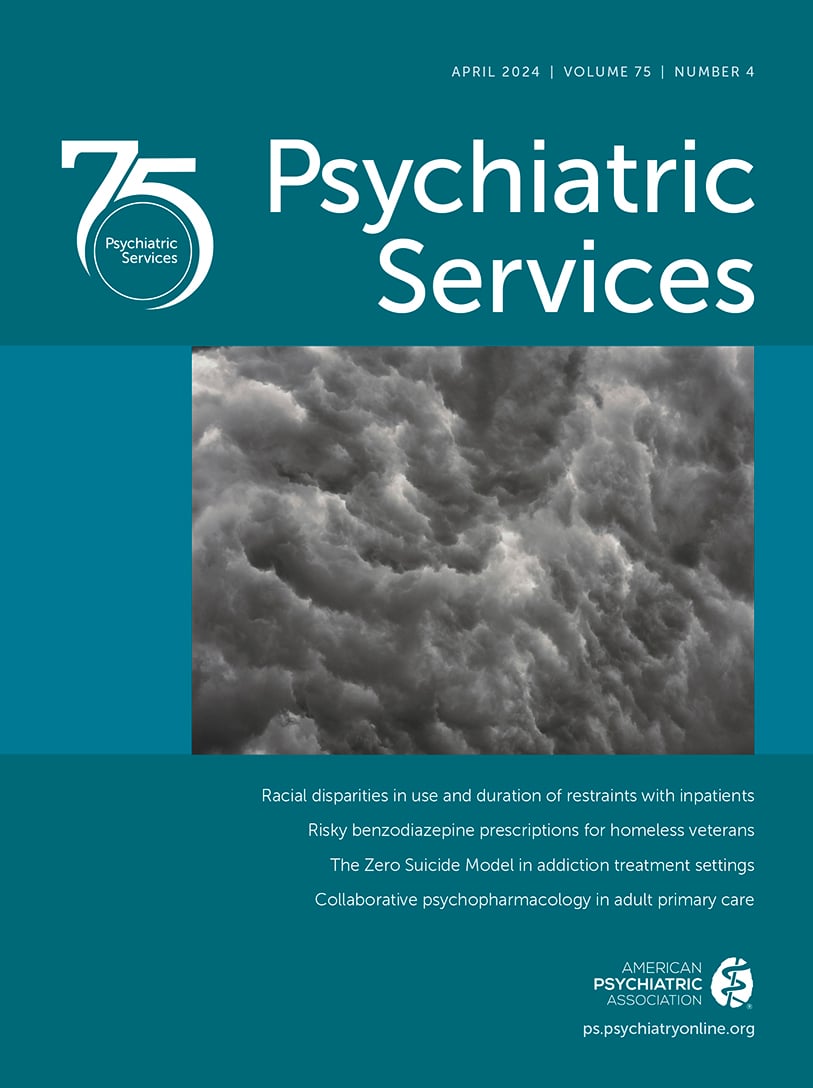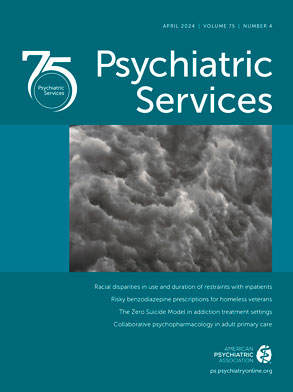Obsessive-compulsive disorder (OCD) is a chronic, disabling psychiatric disorder in which recurrent intrusive and distressing thoughts, impulses, or images and repetitive behaviors or mental acts often disrupt employment (
1–
4). With a lifetime prevalence of approximately 2%, OCD is about twice as common as schizophrenia (
5). Epidemiological studies have found that half the cases of OCD start by age 19 (and a quarter by age 14). After onset, the disorder is typically chronic, with waxing and waning symptoms (
6,
7). Common symptoms of OCD include contamination concerns and washing rituals, fear of harm and checking behaviors, the need for symmetry or order, and taboo thoughts; these symptoms not only take up a great deal of one’s time but also can disrupt activities of daily living. Given its early onset and typically chronic course, OCD is associated with substantially reduced quality of life and impairments in occupational functioning (
1–
4).
First-line evidence-based treatments for OCD include serotonin reuptake inhibitors (SRIs) and cognitive-behavioral therapy (CBT) consisting of exposure and response prevention (EX-RP) (
8). Alone or in combination, SRIs and EX-RP can help up to half of individuals with OCD achieve minimal symptoms (
9). Of critical importance, although these treatments improve quality of life (
10), they have not been found to produce improvement in occupational functioning (
3,
4).
Numerous studies have documented impairments in occupational functioning among individuals with OCD as well as these individuals’ need for financial support due to disability (
2–
4,
11,
12). A Swedish national registry study showed that individuals with OCD (N=16,267) had a 17-fold increased risk for receiving a disability pension, a threefold increased risk for being on long-term sickness leave, and a nearly twofold increased risk for long-term unemployment (more than 180 days), compared with individuals without the disorder (N=157,259) (
2). The U.S. Epidemiologic Catchment Area survey (N=15,567) found that survey respondents with OCD had higher odds of receiving disability payments (adjusted relative risk=2.7) than those without OCD (
11). In a 5-year prospective study of 197 adults with OCD in the United States, one-third of the sample reported the inability to work due to their OCD, and about half of those reporting the inability to work reported receiving disability benefits because of their OCD symptoms (
3). Our recent work that used 2019 New York State Medicaid data found that 29.0% of adult clients with OCD (N=12,942) were receiving Social Security Disability Insurance—nearly twice the rate of adults with any other psychiatric diagnosis except for those with psychosis (
12). Studies thus consistently reveal the alarming rates of occupational disability associated with OCD and highlight the critical need for helping these individuals succeed in competitive employment.
Evidence-based supported employment can help people find and succeed in meaningful work: jobs that match their interests, skills, preferences, and abilities in a supportive work environment that enables them to manage symptoms and build confidence (
13). Prior research has shown that people who attain meaningful employment gain income, self-esteem, structure to their day, new friends, and community integration (
14). They also experience fewer symptoms, crises, and hospitalizations and less dependence on mental health programs (
13,
14). Of the evidence-based supported employment interventions (
14–
16), individual placement and support (IPS) is widely regarded as the most effective one for individuals with serious mental illness (
13,
14). IPS was developed in the United States and subsequently adopted and shown to be effective in other countries (
13). Currently, IPS is the standard vocational approach for people with psychiatric conditions; in 30 randomized controlled trials, the intervention has been shown to be effective in successfully helping diverse populations find and keep employment (
14).
The IPS model follows eight basic principles: the goal of competitive employment (a commitment to typical jobs in the community as an attainable goal for clients), no exclusion (any client interested in working is eligible for IPS services), attention to client preferences (services are based on client choice rather than on provider judgment), rapid job search (preemployment training is avoided), personalized benefits counseling (personalized and accurate information about government entitlements is obtained), integration with mental health services (collaboration with clinicians who provide evidence-based treatment such as CBT), targeted job development (identification of jobs that align with client interests and skills), and individualized follow-along support (e.g., workday supports, tips on managing employer relations).
We propose that IPS can augment evidence-based treatment for OCD by offering the possibility to address both symptoms of OCD and the occupational impairment that often accompanies the disorder. A recent report on 1,028 clients receiving IPS in the state of Minnesota found that 15% had a diagnosis of OCD (
17); however, no study has yet tested IPS specifically for the OCD population.
Modifications have been needed when IPS has been implemented in new populations and settings (
18). We anticipate that IPS will need to be modified for OCD, whether delivered as a stand-alone intervention or as an adjunct to evidence-based treatment. First, when an employment specialist identifies jobs that align with client interests and skills, it will be important to consider jobs that do not trigger OCD symptoms to such a degree that the job is unmanageable or difficult to start. For example, an individual who has fears of contamination focused on medical illness and spends a great deal of time on washing compulsions may consider starting a job that does not directly trigger these fears (e.g., an office job with limited interaction with the public rather than a health-related job that requires daily interaction with people who are ill). Second, an employment specialist can assess preferences for disclosure at work and then collaborate with clients and their clinicians to identify needed accommodations to complete tasks and manage responsibilities. Some examples of reasonable accommodations may include longer deadlines and a modified workspace that limits OCD triggers to those that can be successfully managed by a client without disrupting job performance. Third, employment specialists can work with clinicians to help clients develop skills to master their OCD in the workplace. For example, clients with OCD who are in EX-RP treatment and learning to use the strategy to face their fears and resist performing their compulsions may be coached to practice these skills in the workplace. Repeated and successful exposure practice at work that both reduces OCD symptoms and supports successful work performance may enable an individual to engage in increasingly more diverse job-related tasks. Over time, the workplace can become a regular venue for individuals with OCD to practice “lifestyle” EX-RP (
19)—the goal of this treatment—and thereby can help individuals with OCD not only attain but also maintain their treatment gains.
OCD is recognized as a psychiatric disorder by the Social Security Administration and the Americans With Disabilities Act. The Workforce Innovation and Opportunity Act of 2014 identified the urgent need to improve access to effective services for people who have traditionally faced barriers to employment, including people with psychiatric conditions and those receiving public assistance through programs such as Social Security Disability Insurance (
20). Individuals with OCD face unique challenges that have documented impacts on occupational functioning that do not improve with standard treatment alone and may lead to occupational disability or the need for financial support through public assistance. Although evidence on the use of IPS for individuals with OCD has been reported (
17), IPS has never been formally evaluated for OCD. Therefore, we call for testing the effectiveness of IPS to determine whether it can help individuals with OCD succeed in competitive employment and lead more productive and higher-quality lives.
Acknowledgments
The authors thank Sarah J. Swanson, M.S., for her comments on this Open Forum.

